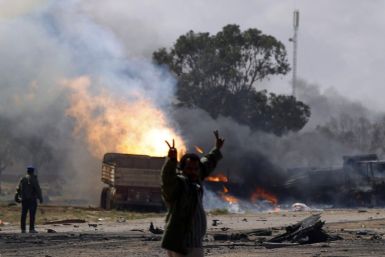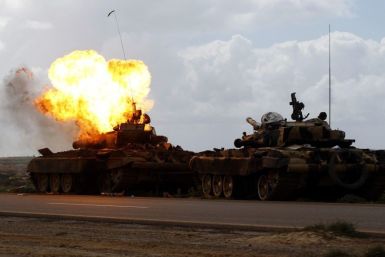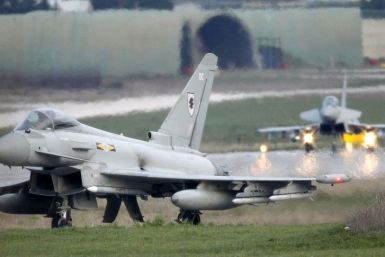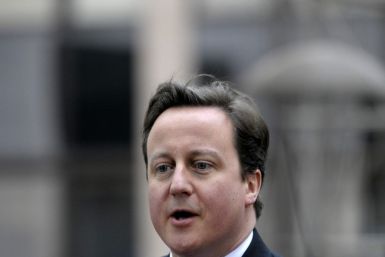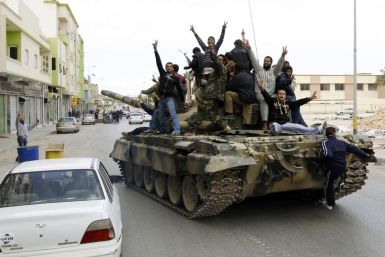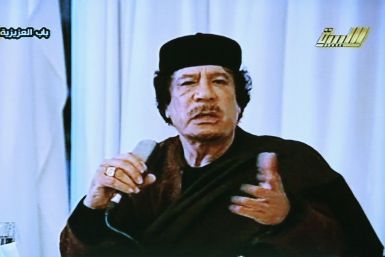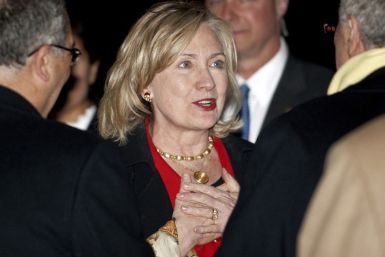An air strike by western coalition forces upon the Libyan capitol Tripoli has reportedly destroyed a three-story building which was a command center used by Moammar Gaddafi.
There was intense speculation on Monday about the whereabouts of Libyan leader Colonel Muammar Gaddafi after allied forces bombed his compound Sunday night, an action reminiscent of the 1986 attack by the U.S. on Gaddafi's compound in which his daughter was killed.
The Pentagon expects to hand over control of allied military operations in Libya in a matter of days, Defense Secretary Robert Gates said.
The Libyan military called for an immediate cease-fire as allied forces pounded convoys across the country.
British, French and American jets conducted bombing and attack operations over Libya on Sunday to enforce a no-fly zone over the country meant to stop leader Muammar Gaddafi's forces from killing civilians as the Arab League criticized the assault, saying casualties among civilians had occurred nonetheless.
In response to airstrikes on his country by a coalition of western nations, Col. Moammar Gaddafi has threatened that Libya will fight a long war.
As a coalition of western nations launch airstrikes on Libyan military targets, British Prime Minister David Cameron warned that the UK could face terrorist reprisals should Moammar Gaddafi’s regime somehow remains in power.
French fighter jets have bombed and destroyed a Libyan military target, marking the first act of enforcement of the United Nations mandate to impose a no-fly zone over Libya
Following reports that President Nicholas Sarkozy has ordered French fighter jets to fly to Libya, British Tornado jets are also prepared to commence with a similar mission.
In what is believed to be the first foreign intervention in the ongoing crisis in Libya, French military jets have flown to the North African country in an effort to prevent Moammar Gaddafi from bombarding Benghazi, the rebel stronghold in the eastern part of the nation.
Forces backing Libyan leader Muammar Gaddafi attacked rebels in the city of Benghazi on Saturday as international leaders met in Paris to discuss how to implement a UN resolution calling for a Gaddafi cease fire and authorizing military action to protect Libyan civilians.
The following is United Nations Resolution 1973, as passed by the Security Council on March 17, 2011 by a vote of 10-0, with 5 abstentions.
President Barack Obama on Friday threatened the use of military force against Libyan leader Muammar Gaddafi, but said any action would not involve U.S. troops on the ground.
German Chancellor Angela Merkel said on Friday that Germany may take on additional tasks in the war in Afghanistan to make up for NATO members' involvement in possible attacks on Libya after a UN vote yesterday approved a possible no-fly zone.
Libya said it will free four employees from the New York Times who had been captured by soldiers allied with Moammar Gaddafi.
US stocks rally on news of Libya announcement of immediate ceasefire.
The government of Libya has declared it will cease all military operations following a decision by the United Nations Security Council to support a no-fly zone over the country.
Crude oil prices rose in Asian trade on Friday, after the United Nations (UN) approved the imposition of a no-fly zone over Libya, raising fresh fears over oil exports from the country.
Bahrain, a tiny island in the western shores of the Persian Gulf, saw no reprieve from the recent anti-government protests.
The United Nations Security Council has approved military strikes on Libyan air defenses, a move following weeks of talks led by France, Britain and the United States to mobilize the international community to take action against the regime of Muammar Gaddafi, which is engaged in armed conflict with rebels.
The United Nations Security Council on Thursday voted to approve a no-fly zone over Libya and all necessary measures to protect civilians from attacks by forces led by Muammar Gaddafi.
U.S. Secretary of State Hillary Clinton said on Thursday that establishing a no-fly zone over Libya would require the bombing of air defenses, as the U.S. seeks broad action to protect civilians fighting Libyan leader Muammar Gaddafi's regime.












